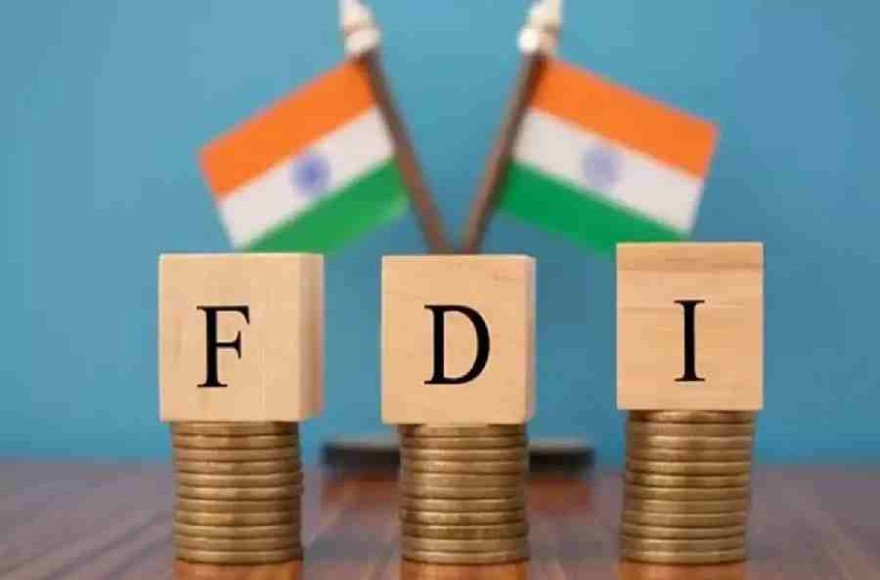Hey, like this? Why not share it with a buddy?

The gross FDI — the money ploughed into India by overseas companies — rose by 13.7% to $81 billion in 2024-25 from $71.3 billion the previous year. The net foreign direct investment into India sunk 96% to $0.4 billion in financial year 2024-25 amid increased repatriation by foreign companies and outward investment by Indian firms, data published by the Reserve Bank of India show. Sources said the figure marked at least a decadal low. The gross FDI — the money ploughed into India by overseas companies — rose by 13.7% to $81 billion in 2024-25 from $71.3 billion the previous year. However, repatriation and divestment by foreign companies — the money foreign investors pulled out — rose by 15% to $51.5 billion in the last fiscal. In comparison, foreign investors had pulled out $44.5 billion in 2024-25. The other factor that crimped the net FDI volume — which some argue reflects poorly on India’s attractiveness as a business destination — was the outward foreign direct investment, that is, investment made by Indian companies abroad. The RBI data show that outward FDI rose 74.8% in 2024-25 to reach $29.2 billion, compared with the $16.7 billion that Indian firms invested abroad during the previous financial year.
Singapore, the US, UAE, Mauritius and the Netherlands together accounted for more than half of the rise in outward FDI. The central bank argued that the 96% fall in the net FDI, from $10.1 billion in 2023-24, reflected the maturity of the Indian economy. “This is a sign of a mature market where foreign investors can enter and exit smoothly, which reflects positively on the Indian economy,” the RBI said in its bulletin for May. Market observers said that divestment and repatriation by foreign companies surged partly because they wanted to take advantage of the booming stock market to cash out. The observers cited the examples of the IPOs of South Korean carmaker Hyundai and food delivery startup Swiggy. In these instances, the foreign investors took the money back home. Besides, exits by venture capitals too surged in 2024-25.
Opinion Divided:
Opinion is divided whether the plunge in the net FDI undermines the Narendra Modi government’s avowed agenda to portray India as an attractive destination to do business, and as an alternative to China as the manufacturing hub of a world increasingly bedeviled by protectionist trade measures and geopolitical uncertainty. “Things are not looking good,” a Mumbai-based fund manager said, arguing that the data showed a lack of interest in India on the part of foreign investors. The finance head of a large manufacturing company, however, argued that it’s the gross FDI that should be considered, while gauging India’s attractiveness as an investment destination. The RBI bulletin said that FDI inflows had remained concentrated in the manufacturing, financial services, electricity and other energy and communication services sectors, their combined share being above 60%. “Singapore, Mauritius, the UAE, the Netherlands, and the US accounted for more than 75% of the flows during this period,” the bulletin said.
‘FDI Paradox’:
Rishi Shah, Partner and Economic Advisory Services Leader of Grant Thornton Bharat, appeared to be taking a middle ground. He said the RBI data had revealed India’s FDI paradox: gross inflows of $81 billion suggested confidence, yet the net flows dropping to $0.4 billion reflected global prudence. “These backward-looking numbers capture a moment when geopolitical uncertainty drove institutional investors toward liquidity over growth — a rational response, not a rejection of India’s fundamentals,” Shah said. “When the world feels unstable, even good stories get parked in cash until visibility improves. India isn’t losing its appeal — it’s experiencing the temporary cost of being an emerging market in turbulent times.” Shah cautioned that FDI flows could be slow this financial year as investors assimilated the new reality and undertook further investment decisions with the utmost caution. Rohit Surana, Director of Gopro Wealth Creators and Tejasspire LLP, argued that global investment flows had been affected by geopolitical tensions, such as the Russia-Ukraine conflict, which had led to subdued growth in the major economies.
Source : https://www.telegraphindia.com/india/worry-over-alarming-96-fdi-plunge-but-rbi-confident-on-maturity-of-indian-economy-prnt/cid/2101583
Related Posts
SEARCH SME E-News
RECENT POST
Categories
- Achievements
- Banking & Finance
- Branding & Marketing
- Business Ethics & Culture
- Business talk
- Business Tycoons
- Capital Market
- Corporate Story
- Davos
- Economy
- Emerging Market
- Entrepreneurial Leadership Dialogue
- events
- Exports
- Grievances
- Growth
- Impact on Business
- Import
- India Growth Story
- Industry
- Innovation and Invention
- Innovative Ideas
- International Affairs
- International Trade
- jobs career
- Manufacturing
- Meeting
- MSME
- Others
- Packaging
- Pharma
- Policies & Schemes
- Regulatory Change
- Schemes
- Skill Development
- SME Talks
- Start-up
- Swot Analysis
- Tax
- Technology & Research
- Textiles
- Travel
- Uncategorized
- Viksit Bharat 2047- Strategies, Contribution, Initiatives and Efforts
- Women Entrepreneurs
- World Economic Forum










